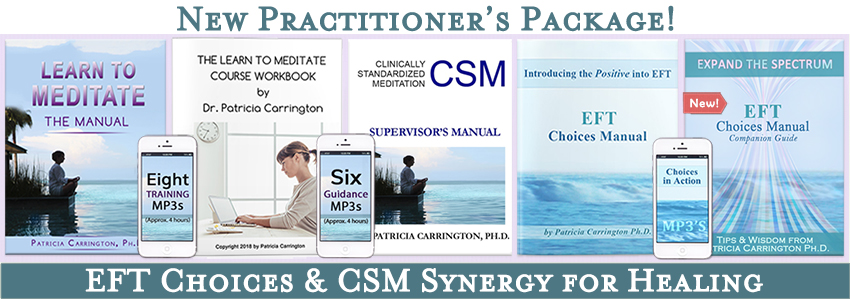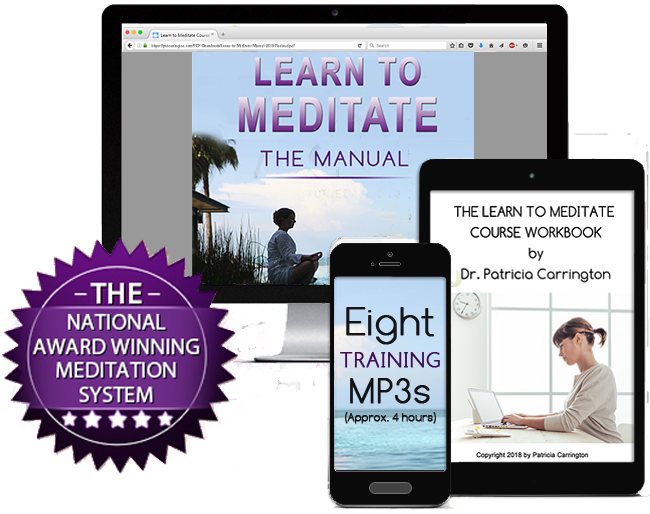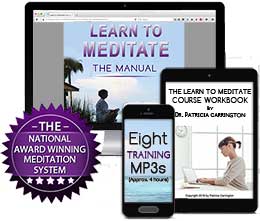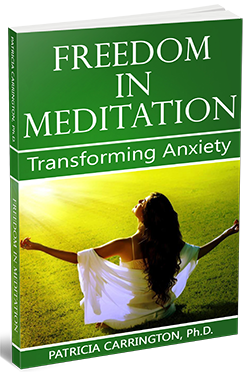The benefits of simple modern forms of meditation that use a “mantra” (a sound that a person repeats mentally while sitting quietly with eyes closed for a stated period of time) have by now been documented by many hundreds of controlled research studies, many of them published in leading professional journals (see meditation research). In addition, there have been thousands of documented clinical reports from physicians, psychologists, health care workers and others engaged in the “helping professions” whose patients or clients have used mantra meditation with great success.
The most well-known methods of mantra meditation are Transcendental Meditation (TM,) which is taught in person in the TM meditation centers, and Clinically Standardized Meditation (CSM), which can be learned at home through the use of audio recordings, together with a programmed, digital instruction workbook and manual.
The benefits that have been systematically reported for these modern forms of mantra meditation are so extensive we could not possibly list all of them here. Below are some of the major ones that have been documented for CSM and TM.
NOTE: Please keep in mind that when we use the word “meditation” in this report that we are referring to “mantra meditation” only, not to a related technique known as “Mindfulness,” which is also shown to yield excellent therapeutic results. Mindfulness is a much more disciplined method than the simple forms of mantra meditation and therefore requires more dedication and more time spent in learning it. For this reason, Mindfulness is usually best mastered in person. We recommend the Clinically Standardized Meditation (CSM) technique for the average person who seeks a simply learned, highly reliable and safe and authoritative training.
The Benefits of Meditation
Below are some of the major benefits reported for the modern forms of mantra meditation. For the source material used here, see Meditation Research.
Deep Rest During the Day
Most people in our fast-paced society find it difficult if not impossible to obtain truly beneficial rest periods during the day. A practice of meditation may supply an especially effective form of enforced rest each day—one that is easier for the average person to observe than are vague therapeutic prescriptions to “take it easy and get more rest.” Meditation is particularly effective in this respect because it is a novel, out-of-the ordinary activity for most people.
Reduction in Tension/Anxiety
A large number of research studies and clinical reports have agreed in reporting that anxiety has been found to be sharply reduced in a majority of subjects after they have commenced the practice of mantra meditation. The resulting sharp drops in anxiety levels can be dramatic and is undoubtedly related to the improvement seen in many physical symptoms of stress after commencing the practice of meditation. These include normalization of blood pressure, decreased cholesterol levels, significant improvement in heart symptoms etc.
In fact, if a medical condition is in any way related to anxiety or stress, meditation is often of much use in treating this condition. An advantage of meditation is that it can be used along with any prescription medications, which make it highly desirable for medical purposes. In the case of panic disorders where patients can easily be overwhelmed by their symptoms and therefore drop out of a meditation practice prematurely, it may be necessary to have the help of a health practitioner to monitor the persons meditation practice.
When observing meditation in hospitalized patients, researchers have found that dosages of psychotropic drugs could be greatly reduced after these patients had been meditating for several weeks and that in a majority of cases, the use of sedatives could also be reduced or eliminated in those patients. Meditation has also been reported as successful in lowering the anxiety experienced by patients preparing for cardiac surgery or for ambulatory surgery.
The quieting effects of mantra meditation differ from the effects brought about by anti-anxiety medications, however. Although the relaxation brought about by drugs may slow the person down and cause grogginess, the relaxation resulting from meditation does not bring with it any loss of alertness.
In fact, meditation seems to sharpen alertness. Groups of meditators have been shown to have faster reaction times and better refinement of auditory perception, to show increased vigor, and to perform more rapidly and accurately on perceptual-motor tasks motor tasks than non-meditating groups of subjects. Mantra meditation may therefore be indicated whenever anxiety is a problem, and can often be used productively in place of tranquilizers or as a supplement to drug treatment.
Reduction in the Stress Response
A number of carefully controlled research studies have shown physical indications of stress such as elevated blood pressure, accelerated heart rate, tension headaches and the like to be sharply reduced in persons practicing mantra meditation. As a result, researchers have concluded that simple forms of meditation can be a highly effective intervention when a person is under high stress.
Improvement in Stress Related Illnesses
Many stress-related illnesses have proven responsive to a simple form of modern meditation such as CSM or TM. Research has shown the use of mantra meditation to be correlated with:
- improvement in the breathing patterns of patients with bronchial asthma;
- decreased blood pressure in both pharmacologically treated and untreated hypertensive patients;
- reduced premature ventricular contractions in patients with ischemic heart disease;
- reduced symptoms of heart disease (angina pectoris);
- reduced cardiovascular mortality;
- reduced serum cholesterol levels in hypercholesterolemic patients;
- reduced sleep-onset insomnia;
- amelioration of stuttering;
- lowered blood sugar levels in diabetic patients;
- lessening of psoriasis;
- reduced pain and bloating in irritable bowel syndrome; and,
- with reductions in the symptoms of severe psychiatric illness.
Studies have also shown that meditation may reduce salivary bacteria and thus be useful in treating dental caries and decrease periodontal inflammation. It may also reduce some coronary-prone behavior patterns and may be beneficial in lowering central nervous system responsivity to norepinephrine . Mantra meditation can thus be a useful intervention in a wide variety of stress-related conditions.
Increased Productivity
A beneficial surge of energy is often noted in persons who have commenced the practice of mantra meditation. This can manifest itself variously as a lessened need for daytime naps, increased physical stamina, increased productivity on the job, increased ideational fluency, the dissolving of writer’s or artist’s “block,” or the release of hitherto unsuspected creative potential. Mantra meditation may therefore be useful when it is desirable to increase available energy and/or when a person is experiencing a block to productivity.
Improvement in Mental Acuity
Several studies have shown improved cognitive functioning in those who meditate regularly. Meditation has been shown to exert a beneficial effect on memory in elderly persons, and studies have shown that Students who meditate tend to achieve higher grade point averages. Secondary school teachers who were taught CSM, also scored significantly lower on the Confusion- Bewilderment scale of a widely accepted mood assessment questionnaire than did non-meditating teachers. These and similar studies suggest that mantra meditation can be of considerable use in the educational system.
Lessening of Self-Blame
A useful by-product of mantra meditation may be an increased self-acceptance, often evidenced as a lessening of unproductive self-blame. A spontaneous change in the nature of a meditator’s self-statements—from self-castigating to self-accepting— suggests that the noncritical state experienced during the meditation session itself can generalize to daily life. Along with the tendency to be less self-critical, the meditator may show a simultaneous increase in tolerance for the human frailties of others, and there is often a resulting improvement in interpersonal relationships. Mantra meditation may therefore be useful whenever a tendency toward self-blame is excessive or when irrational blame of others has become a problem.
Anti-addictive Effects
Several studies have shown that, at least in persons who continue meditating for long periods of time (usually for a year of more), there may be a marked decrease in the use of nonprescription drugs, such as marijuana, amphetamines, barbiturates, and psychedelic substances (e.g., LSD). Many long-term meditators, in fact, appear to have discontinued use of such drugs entirely. Similar anti addictive trends have been reported in ordinary cigarette smokers and abusers of alcohol as well. Mantra meditation may therefore be very useful for a patient suffering from an addictive problem, particularly if that problem is in its incipient stage.
Mood Change and Elevation
Both research and clinical evidence suggests that people suffering from mild chronic depression or from a reactive depression may experience distinct elevation of mood after commencing mantra meditation. Meditation therefore appears indicated in mild or chronic depressive reactions, but probably not in acute depressions which require medication.
Increase In the Availability of One’s Emotions
People who have commenced meditating frequently report experiencing pleasure, sadness, anger, love, or other emotions more easily than before. Sometimes they experience emotions that have previously been unavailable to them. Release of such emotions may occur during a meditation session or between sessions, and may be associated with the recovery of memories that are highly emotionally charged.
Meditators frequently report that they have become more aware of their own opinions since commencing meditation; that they are not as easily influenced by others as they were previously; and that they can arrive at decisions more quickly and easily. They may also be able to sense their own needs better, and thus may become more outspoken and self-assertive and more able to stand up for their own rights effectively. Meditators may also begin to show greater “inner-directedness” following the commencement of the practice of mantra meditation and meditators may show a marked increase in their sense of identity and confidence.
One result of this increased sense of identity may be marked improvement in the ability of a meditator to separate from others who are important in their life when such separation is called for. Meditation can therefore be extremely useful in two-prolonged bereavement reactions, or in cases where an impending separation (threatened death of a loved one, contemplated divorce, upcoming separation from growing children, etc.) presents a problem. Meditation is therefore indicated wherever separation anxiety is a problem. Meditation is particularly useful in bolstering the inner sense of “self” necessary for effective self-assertion.
Lowered Irritability
The meditating person may become much less irritable and impulsive in his or her interpersonal relationships within a relatively short period of time. For example, a group of teachers practicing CSM were shown to have scored significantly lower on the Anger-Hostility and Hostility scales in the POMS and SCL-90 mood scales after commencing meditation. A similar reduction in irritability and impulsivity could well be related to the lowered recidivism noted in prisoners practicing mantra meditation. Meditation thus appears to be indicated wherever impulsive outbursts or chronic irritability is a symptom.
Observations have even shown meditation to be useful in increasing overall adjustments in several cases of brain injury.
NOTE: The benefits listed above are not the only positive results that have been observed in those commencing the practice of mantra meditation. This is only a representative sampling of the research. For more details see Meditation Research.
Learn about Clinically Standardized Meditation
A Gentle, Easy-to-Learn, Form of Meditation
Dr. Carrington’s Clinically Standardized Meditation (CSM) is a clinically sensitive meditation method used by numerous medical institutions, organizations, and individuals worldwide.
The main advantages of CSM (and also its difference to other forms of techniques of meditation) are its simplicity, its flexibility and its sensitivity to the individual needs and inclinations of the people who learn it. CSM is extremely permissive, which makes it easier to personalize and internalize the technique and its experience.
By Dr.Patricia Carrington








